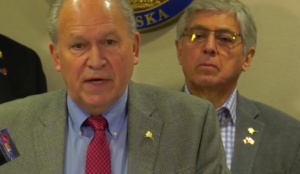
My kingdom for a comma: Governor’s grammar-challenged proclamation
The proclamation for the Oct. 23 special session is a lesson in commas. Or lack thereof.
The proclamation by Gov. Bill Walker states he is calling the Legislature back to Juneau to focus on two things: Crime, and a tax on the self-employed.
Yes, that is, in fact, what his proclamation says: Just the self-employed.
It’s a matter of comma usage:
“An act or acts enacting a tax on wages and net earnings from self-employment; and relating to the administration and enforcement of the wages and net earnings from self-employment tax.”

Without the comma between “wages” and “net earnings from self-employment,” it appears that all who work for others will not have to pay the Walker income tax. State workers, for instance.
His verbiage only targets the people who work for themselves, such as the smallest of the small business owners in Alaska.
Surely this isn’t what Walker intended. And surely there are enough commas to go around in Alaska, unless those, too, are in short supply.
Millett mulled Senate, then decided to stay with ‘People’s House’
When Sen. Kevin Meyer filed his letter of intent for the lieutenant governor’s race earlier this month, both of the Republican House members in his South Anchorage district were interested in filling the void in the Senate.
Rep. Chris Birch jumped in first, on a hunch, before Meyer had even announced for lieutenant governor.
House Minority Leader Charisse Millett also eyed the seat — after all it’s a lot more fun to be in the majority in the Senate than the minority in the House.
In the end, she went with the legislative body that is closest to the people in District 25. She filed for reelection to her House seat on Thursday, flanked by Rep. Birch and Sen. Meyer.
“We have a strong team in South Anchorage and it just makes sense to unite, and provide the House, the Senate and the governor’s team with a strong group of leaders,” she said. “This is how Republicans need to do it — working together. We need to provide stability in the House and I’m going to focus on issues like crime, the budget, and fighting to take back seats for the side that is standing between Alaskans and taxes.”
Governor asks for ‘Goldilocks income tax’
Gov. Bill Walker has given the first hint about how he intends to get more revenue for the State of Alaska during the Oct. 23 special session: It’s an income tax. Again. The Walker Administration claims it’s not an income tax, but rather a payroll tax.
Not an income tax, but tax based on income?
Walker was opposed to an income tax when he was running for governor, but has advocated for one ever since taking office. His 2016 proposal would have brought in $200 million of taxes from working Alaskans, and would grow state government by 60 new revenue agents. Alaska’s very own IRS.
By 2017, his plan had grown to nearly $800 million. And he’s offered several other revenue targets in a half dozen proposals his administration has put forward.
This one is Walker’s Goldilocks version, pulling in $300 million to fill the gap, whatever that gap may be.
Walker is hoping, like Goldilock’s third bowl of porridge, this time it’s “just right.”

The Walker tax would skim 1.5 percent off of wage earners, which would be capped once income reaches $150,000. The top-end taxpayers would pay $2,200 to the Department of Revenue to raise cash for the government.
Today’s reveal of the income tax came in the official proclamation for the special session, which includes criminal justice reform measures. The governor’s office distributed the packet for the tax bill this afternoon. Must Read Alaska has not seen the details yet.
The Democrat-led House majority favors an income tax, but the Senate Republican majority is still dead set against one, according to Sen. President Pete Kelly of Fairbanks.
“The Senate Majority supports a special session in October to address crime. Alaskans have legitimate concerns about our laws holding offenders accountable,” said Sen. Kelly in a statement. “The Senate already passed the legislation, SB 54, toughening penalties for certain crimes. We offer our support to the House to do the same, and stand by to work out any differences. Alaskans should feel safe in their homes and communities, and it is incumbent upon the Legislature to do our part to ensure criminals face consequences.”
“The Senate Majority welcomes additional discussion on the state’s fiscal problems, which we believe are best addressed by reducing government budgets and instituting a spending limit. We have asked the administration, before new taxes on working Alaskans are considered, to provide a budget for the coming fiscal year that includes reductions in spending, and a revised revenue forecast with responsible estimates of oil price and production,” he said.
“With this information in hand, the Senate will be able to accurately determine what, if any, actions must be taken to raise additional revenue from Alaskans. We want to make it clear that any ‘complete plan’ to address our fiscal problem cannot solely reach into Alaskans’ pockets for more government money, but must include budget reductions. Government has to do its part,” Kelly said.
His position was echoed by the Senate Majority Leader Peter Micciche today.
“Until the Senate is convinced that there is a gap over the long term, and when both sides agree on the range of the gap, we will continue to protect working Alaskans from taxes that unnecessarily overcapitalize this government,” said Micciche, of Soldotna.
“Our request to the administration was to very publicly and transparently meet in Anchorage in a work session, including people on both sides of the aisle, to clarify why they believe our numbers are incorrect, and to agree on a range going forward.”
Micciche said a work session rather than a special session would save the state per diem. It would give the governor the opportunity to have his team present their case in a place where many Alaskans could get to hear both sides. The Senate majority is also asking for updated revenue numbers from the Administration to better evaluate the actual fiscal gap.
Costello announces effort to repeal SB 91
Sen. Mia Costello announced today she will introduce a bill to repeal SB 91, the criminal justice reform bill that is being widely blamed for a crime wave across Alaska.
“While SB 91 was well-intentioned and well researched, my constituents, neighbors and friends are calling out for repeal of this bill,” Costello said. “A repeal bill is necessary. Every Alaskan is suffering from either a burglary, theft or threat of these crimes, or worse, making us feel unsafe in our own homes and neighborhoods.”
“We need to start fresh with a clean slate and move forward in a way that protects Alaskans. We’re not going to have a productive conversation if we are trying to untangle SB 91.”
Costello, who represents District K, which is West Anchorage, chairs the Senate Labor and Commerce Committee. She was a cosponsor of the omnibus bill.
Alaska’s bill resembles laws passed in Texas, which pioneered criminal justice reform. There, crime has started to go down, as the state spends money on data-driven methods that reducing crime. SB 91 has been in effect for a little more than one year, but Alaskans are experiencing an unprecedented crime wave.
The special session that will convene on October 23 will take up SB 54, which toughens penalties that were loosened by SB 91 for some less serious crimes.
SB 91 adopted evidence-based pretrial reforms, including the following elements from the UAA Justice Center summary of SB 91:
Risk-Based Release Decision-Making
Release decisions are made based on a defendant’s risk of re-offending, which is determined by using a screening mechanism:
Defendants fall into three categories:
- Required release on personal recognizance or unsecured bond: Low- and moderate-risk defendants charged with non-violent, non-DUI misdemeanors; low-risk defendants charged with non-violent, non-DUI class C felonies.
- Presumption of release on personal recognizance or unsecured bond, which can be overcome if the judge finds that monetary bail is the only way to reasonably assure court appearance and public safety: Defendants charged with DUI; low- and moderate-risk defendants charged with failure to appear or violation of release conditions; high-risk defendants charged with a non-violent misdemeanor; moderate- and high-risk defendants charged with a non-violent class C felony; and all other defendants assessed as low-risk for pretrial failure.
- Monetary bail may be ordered: All other defendants, which includes any moderate- and high-risk defendant charged with a DV [domestic violence], or sex offense or higher-level felony. In all cases, the courts may order additional, non-monetary release conditions, including complying with pretrial supervision, so long as they are the least restrictive conditions necessary to assure court appearance and public safety.
Failure to Appear and Violation of Conditions of Release (VCOR)
Failure to Appear is now an arrestable violation, unless the defendant fails to appear for more than 30 days or in order to avoid prosecution, in which case it remains a misdemeanor or Class C Felony.
Violation of Conditions of Release is now an arrestable violation. Under SB 91, failure to appear and violation of conditions result in arrest, revoking bail, conducting a new pretrial risk assessment, and then either detaining the individual in prison or releasing the person with greater restrictions or conditions.
Felony Theft Threshold
SB 91 increases the threshold value for theft related offenses from $750 to $1,000 and requires the level to be adjusted every five years to account for inflation.
Shoplifting
SB 91 eliminates use of incarceration as a sanction for theft under $250 (first two offenses), and limits the use of incarceration to 5 days suspended imprisonment and six months of probation for subsequent shoplifting offenses.
Controlled Substances
SB 91 changed consequences for having controlled substances:
It reduces the classification of possession offenses for all controlled substances except GHB [gamma-hydroxybutyric acid] to a Class A Misdemeanor and eliminates active prison time for the first two misdemeanor possession offenses.
It reduces the penalty for commercial offenses relating to less than 1 gram of a IA substance or 2.5 grams of IIA or IIIA controlled substances to a Class C Felony, and more than 1 gram of a IA controlled substance to a Class B Felony.
Traffic Offenses
Senate Bill 91 includes the following policy changes related to traffic offenses:
Removes the mandatory minimum for first time DUI-related DWLS [Driving With License Suspended] offenders and reduces the mandatory minimum for second time DUI-related DWLS offenders to 10 days.
Reduces the penalty for non-DUI-related DWLS offenses from a misdemeanor to an infraction.
Requires first-time DUI offenders to serve a mandatory term of electronic monitoring. If this is unavailable, imprisonment is determined by the Department of Corrections.
[Read a comprehensive summary of SB 91s at the UAA Justice Center]
Breaking: Hawkins files for governor; focus will be on economy, dividends, crime
Business entrepreneur and political activist Scott Hawkins filed a letter of intent to run for governor, becoming the fourth well-known Republican to do so.
Hawkins founded and has operated a supply chain management company for 18 years, with business in Alaska, the Lower 48, the Caribbean, and South America. Advanced Supply Chain International (ASCI) has approximately 200 employees.
Hawkins has been active in politics with The Accountability Project and AlaskaWins.org, which helps produce the annual Alaska Business Report Card, a project that scores legislators on how pro-business and pro-jobs their actions are in Juneau using a detailed and rigorous scoring criteria.
Hawkins is an economist by training and said his candidacy will focus on Alaska’s economy and growing jobs, as well as on closing the fiscal gap and public safety issues.
“In talking with people across Alaska, it is clear to me that voters are very dissatisfied. They overwhelmingly feel that Alaska is on the wrong track, and they hold our current leaders responsible. They are ready for a change of direction. They are ready for a governor who will bring new solutions and fresh ideas to Juneau,” Hawkins said.
The letter of intent allows Hawkins to raise funds and talk with Alaskans across the state about the future.
Hawkins said:
“I’ve spent a good amount of time in the Interior in the past few months just listening to people, and I’ve heard that we need to get our economy moving again.
“I’m upbeat about our future. More oil has been discovered in the past three years than at any time since the Prudhoe Bay discovery, and mining companies have more new projects in the pipeline than ever,” he said.
Hawkins said politicizing the Permanent Fund is the wrong direction.
“Governor Walker made a grave error when he vetoed the Permanent Fund dividend amount by half. Rather than being driven by a formula, it is now whatever the governor thinks it should be,” he said.
Hawkins is also hearing from Alaskans about crime:
“When Governor Walker signed criminal justice reform, Senate Bill 91, he touched off a crime wave. Our communities are much more dangerous than they were just two years ago. Public safety has deteriorated very quickly. Better approaches are needed. Simply failing to prosecute first and second time offenders is not the answer, nor is a return to high incarceration rates,” he said.
Hawkins launched his campaign website and will start his campaign in Ketchikan, Sitka, and Juneau in the coming days.
Hawkins is a senior contributor to Must Read Alaska, and through his organization, Alaska Wins, he is an advertiser on this web site.
Other Republicans who have filed include Michael Sheldon of Petersburg, Sen. Mike Dunleavy of Wasilla, former Sen. Charlie Huggins of Wasilla and Rep. Mike Chenault of Kenai.
When Boomers bail
By WIN GRUENING
SENIOR CONTRIBUTOR
“When the Boomers Bail, A Community Economic Survival Guide” is the title of a book by Mark Lautman.
Although written in 2011, it has begun receiving more attention recently as “baby boomers” began retiring in ever increasing numbers.
With over three decades of experience in professional economic development, Lautman is widely credited with recognizing the impending new economic paradigm in communities across the nation caused by shifting demographics, our country’s lack of a properly educated workforce and the competition among communities to attract a sufficient supply of qualified talent to fill needed jobs.
By happenstance, Lautman met with local Juneau resident, Bruce Denton, on a sailboat trip in the Caribbean last year. The two had attended high school together in the Seattle area but had not connected since their graduation. During their visit, Denton learned about Lautman’s book and his background and wondered if Lautman would be willing to come to Juneau.
Denton was so impressed after reading Lautman’s book that he bought 100 copies and began distributing them around Juneau asking people to read the book and then share it with a friend. He personally numbered every book and tracked where each copy went.
Eventually, the details were worked out and Lautman visited Juneau this last week – appearing in several different venues explaining his message how communities can continue to prosper in the coming decade and beyond.
Mark Lautman’s message turns conventional wisdom on its head. He believes that almost everything that he and other economic development specialists have learned over the course of their careers will be almost useless in the coming decades.
Lautman paints a picture that is, frankly, scary. The situation he describes is imminent and irreversible and potentially catastrophic for communities that ignore the warning signs.
According to Lautman, this is due to several factors. The “baby boomer” generation didn’t have enough kids, the birth rate continues to decline, people are living longer, and our educational system is not preparing students with the skills needed to work in the changing economy.
As our population ages and becomes more dependent, there will be fewer and fewer qualified workers to replace those that retire. Functionally, we will reach “full employment” but with many jobs left unfilled.
The nature of jobs is changing. Advances in technology, robotics and artificial intelligence will demand technical skills and complex reasoning processes that aren’t emphasized in our schools today. Many of the manufacturing and retail jobs in our economy today will disappear and the workers who held them will not have the requisite skills for other available jobs.
Eventually, a relatively small proportion of our population will be employed trying to support the unemployed, the unemployable, and those who are too young or too old or who choose not to work.
Qualified workers will be in such demand that they will decide what jobs they want and where they will work. Communities and companies will compete for jobs and qualified workers. Some communities will win and prosper. Others will fail.
The power held by civic leaders to attract a company or an industry to locate in their community will vanish. It will be the existing or future employees who will decide where the jobs will locate and where economic development will occur.
What does this all mean for our community?
First, we need to decide whether we want to be a “winner” or a “loser” in the new economy. Lautman says to be a “winner”, we will need to grow our economy faster than our population for us to flourish. When an economy grows slower than the population it serves, there will be more people every year and fewer and fewer resources to support them.
It follows, then, we should determine what our future population will be and then calculate how many “economic base jobs” will be needed to support that population—jobs that export goods and services and import wealth.
From there, a community-wide assessment is needed to identify in what sectors those jobs could reasonably be found. The important part of this exercise will be to catalog the assets and obstacles impacting our ability to get those jobs – including all the important features necessary to attract future employees to live in Juneau.
It is necessary the process involve all stakeholders in the community and agreement reached on all steps along the way. The result should be a comprehensive economic plan for our community that is specific, measurable, and has broad community support.
Our local assembly must make this a high-priority topic at their next retreat. Lauter’s best advice: “Grab all the economic base jobs you can.”
This exercise won’t be easy and requires vision, optimism, and compromise. But the alternative is unacceptable.
Win Gruening retired as the senior vice president in charge of business banking for Key Bank in 2012. He was born and raised in Juneau and graduated from the U.S. Air Force Academy in 1970. He is active in community affairs as a 30-plus year member of Juneau Downtown Rotary Club and has been involved in various local and statewide organizations.
Millett: Crime meeting set for District 25
Representative Charisse Millett is hosting a crime townhall meeting in Anchorage on Monday, Sept. 25 to hear concerns from District 25 residents about the criminal activity in the community and thoughts about how to stem the crime wave in Anchorage and around the state.
“My friends and neighbors reach out to me literally every day to express their concerns with how unsafe our community has become,” Rep. Millett said. “I want to be sure all residents of District 25 have a chance to participate in a dialogue, share their ideas, and be fully represented in the upcoming Special Session.”
The meeting Abbott Loop Elementary School is from 6:30-8 pm. Millett, the House Minority leader, has invited officials from the public safety and justice system to listen and share their ideas for ways to reform laws.
Murkowski looks closer at Graham-Cassidy Obamacare overhaul
“Lisa Murkowski walked briskly down a cavernous hallway on the first floor of the Capitol, awash in a small sea of reporters. Suddenly she paused, seemingly overcome by the pressure of the moment.”
So starts the Washington Post story on the latest effort to reform the Affordable Care Act and the woman in the middle of the storm.
If the writing seems a bit breathless, it’s because Sen. Murkowski was trying to get reporters to back off a bit. She needed air.
Murkowski is under pressure as the Senate tries to move a new Obamacare reform bill that would send block grants to states. She’s going to have to take a stand again, but the last time she did, her Republican base was deeply disappointed. The party telephones rang off the hook with angry constituents, while Democrats heaped praise on the Republican senator from Alaska.
The Graham-Cassidy amendment, which would create block health care grants to the states, has a short window to pass — Sept. 30 — and the pressure is on once again.
“‘You guys — hold,’ the Republican senator from Alaska said curtly,” the Post reports today. ‘Give me breathing room, please. It gets a little intense. I know you guys don’t feel it, but it’s like, whoa.'”
“Another effort to replace the Affordable Care Act is underway, and in Washington this year, that means one thing: Murkowski is at the center of it all — under the glare of the national spotlight and squarely on the minds of White House officials and Senate Republican leaders who are strenuously seeking her support.”
But this time around, Alaska’s senior senator has assumed a slightly different posture than the fighting stance she took on during July when she bolted from the Senate majority and voted with Democrats.
Now, at least she says she wants to study the Graham-Cassidy bill more closely.
Murkowski told reporters she’s not yet ready to support it, but she and Sen. Dan Sullivan met with Sens. Lindsey Graham and Bill Cassidy today. She said: “I have asked for nothing except the data that we’re going to need to better understand the impact to a high-cost, low-density state like Alaska.”
She wants data from the Centers for Medicare and Medicaid Services and the Department of Health and Human Services, “working with our state’s Medicaid directors.”
The Post describes Murkowski as brusque, unpredictable, mysterious and complicated. A lot like Alaska, the reporter surmises.
“The problem last time was process and substance,” Murkowski said to the Post reporter, while explaining why she could vote for the Graham-Cassidy amendment. “Nobody knew what we were really . . . voting on.”
Murkowski’s words indicate she’s not all-in on keeping the existing Obamacare after all, and may vote yes on this version of reform:
“If it can be shown that Alaska is not going to be disadvantaged, you gain additional flexibility,” Murkowski said. “Then I can go back to Alaskans, and I can say, ‘Okay, let’s walk through this together.’”
[Read the Washington Post story here]
Tuckerman Babcock, chairman of the Alaska Republican Party said, “It’s something that has to be done. They promised to do it. It needs to happen and I’m glad they are working on it. I’m not going to weigh in on any detail or itieration of a bill. But I am delighted and encouraged they continue to work on it.”
Some observers in Alaska are mystified with Sen. Murkowski’s recent opposition to Obamacare repeal. They point out that if she truly wants a bipartisan bill, then keeping Obamacare works against that goal. Far better, they say, to repeal Obamacare, giving Republicans the negotiating leverage they need to hammer out an acceptable bipartisan compromise.


